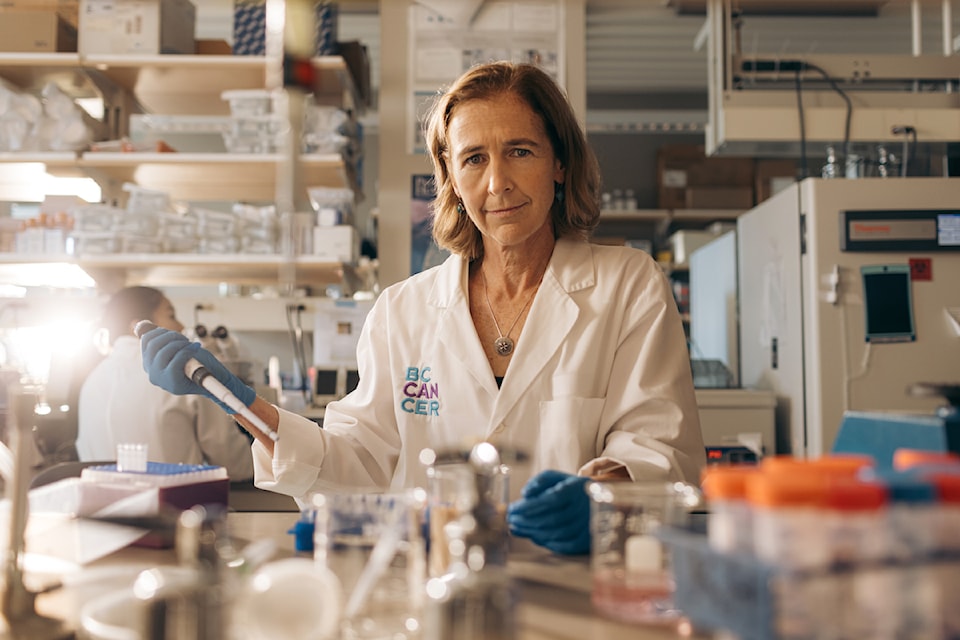Science
AI Innovation Aims to Revolutionize Women’s Cancer Care in Victoria

A pioneering artificial intelligence (AI) initiative from British Columbia is set to enhance the future of women’s cancer treatment in Victoria. Researchers Dr. Jessica McAlpine and Dr. Ali Bashashati from BC Cancer and the University of British Columbia (UBC) are utilizing AI to improve the diagnosis and treatment of endometrial cancer, which ranks as the sixth most common cancer affecting women globally.
Endometrial cancer presents unique challenges as its cells can often appear ambiguous, leading to inconsistent diagnoses. This uncertainty complicates decisions regarding patient treatment and the types of interventions necessary. The research team has made significant strides by categorizing this cancer into four distinct groups, each associated with different clinical outcomes. Yet, one group remained diverse, prompting the introduction of the AI ProMisE test.
“We were able to look at these images of tumours and identify things that the pathologist couldn’t see and that the molecular tools couldn’t identify,” said Dr. McAlpine. This advanced technology enhances doctors’ ability to predict which patients, who initially seem to have a favorable prognosis, may actually face worse outcomes. As a result, clinicians can provide more targeted treatments, potentially preventing cancer recurrence.
The AI system also benefits patients by reducing unnecessary treatments and travel. Dr. McAlpine noted, “Because of the tools we now have, some patients can avoid the toxicity of chemotherapy and radiation altogether.”
Plans are underway to implement these AI tools, which include advanced scanners and hardware, in medical centres like those in Victoria. Dr. McAlpine indicated that this could occur as early as next year, depending on the availability of philanthropic funding and necessary approvals. “We plan to pilot it in a couple of centres, and Victoria is potentially one of those,” she explained.
For Dr. Brad Nelson, who has recently been appointed as the Immunotherapy Research Chair at BC Cancer in Victoria, this development is particularly significant. He has previously emphasized the need for more research into women’s cancers, a cause close to his heart. Joyce Deeley, the wife of notable BC Cancer donor Trev Deeley, passed away from ovarian cancer in 2001, leading to the establishment of the Trev & Joyce Deeley Research Centre in 2003 following a generous donation of $5 million in her memory.
“Gynecological cancers are some of the most difficult cancers to treat and historically are an understudied area of cancer research,” stated William Litchfield, Associate Vice President of the BC Cancer Foundation (Vancouver Island). He remarked on the importance of the innovative research being conducted at BC Cancer, which holds the potential to save lives not just on Vancouver Island, but across the province.
The announcement of this AI application coincides with Gynecological Cancer Awareness Month, observed in September. Dr. McAlpine highlighted the broader implications of AI technology in oncology, stating, “There are so many other applications we’re also looking at.” She added that these AI tools provide a more personalized and precise approach to treatment, moving away from a one-size-fits-all methodology.
As this promising research continues to progress, the integration of AI into women’s cancer care could significantly alter treatment landscapes, improving outcomes for patients and paving the way for enhanced diagnostic capabilities.
-

 Education3 months ago
Education3 months agoBrandon University’s Failed $5 Million Project Sparks Oversight Review
-

 Science4 months ago
Science4 months agoMicrosoft Confirms U.S. Law Overrules Canadian Data Sovereignty
-

 Lifestyle3 months ago
Lifestyle3 months agoWinnipeg Celebrates Culinary Creativity During Le Burger Week 2025
-

 Health4 months ago
Health4 months agoMontreal’s Groupe Marcelle Leads Canadian Cosmetic Industry Growth
-

 Science4 months ago
Science4 months agoTech Innovator Amandipp Singh Transforms Hiring for Disabled
-

 Technology4 months ago
Technology4 months agoDragon Ball: Sparking! Zero Launching on Switch and Switch 2 This November
-

 Education4 months ago
Education4 months agoRed River College Launches New Programs to Address Industry Needs
-

 Technology4 months ago
Technology4 months agoGoogle Pixel 10 Pro Fold Specs Unveiled Ahead of Launch
-

 Business3 months ago
Business3 months agoRocket Lab Reports Strong Q2 2025 Revenue Growth and Future Plans
-

 Technology2 months ago
Technology2 months agoDiscord Faces Serious Security Breach Affecting Millions
-

 Education4 months ago
Education4 months agoAlberta Teachers’ Strike: Potential Impacts on Students and Families
-

 Education3 months ago
Education3 months agoNew SĆIȺNEW̱ SṮEȽIṮḴEȽ Elementary Opens in Langford for 2025/2026 Year
-

 Science4 months ago
Science4 months agoChina’s Wukong Spacesuit Sets New Standard for AI in Space
-

 Business4 months ago
Business4 months agoBNA Brewing to Open New Bowling Alley in Downtown Penticton
-

 Business4 months ago
Business4 months agoNew Estimates Reveal ChatGPT-5 Energy Use Could Soar
-

 Technology4 months ago
Technology4 months agoWorld of Warcraft Players Buzz Over 19-Quest Bee Challenge
-

 Business4 months ago
Business4 months agoDawson City Residents Rally Around Buy Canadian Movement
-

 Technology4 months ago
Technology4 months agoFuture Entertainment Launches DDoD with Gameplay Trailer Showcase
-

 Technology2 months ago
Technology2 months agoHuawei MatePad 12X Redefines Tablet Experience for Professionals
-

 Top Stories3 months ago
Top Stories3 months agoBlue Jays Shift José Berríos to Bullpen Ahead of Playoffs
-

 Technology4 months ago
Technology4 months agoGlobal Launch of Ragnarok M: Classic Set for September 3, 2025
-

 Technology4 months ago
Technology4 months agoInnovative 140W GaN Travel Adapter Combines Power and Convenience
-

 Science4 months ago
Science4 months agoXi Labs Innovates with New AI Operating System Set for 2025 Launch
-

 Technology4 months ago
Technology4 months agoNew IDR01 Smart Ring Offers Advanced Sports Tracking for $169










